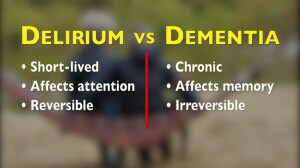Some Thoughts on Depression and Dementia
How does depression fit in with the conversation about dementia?
First of all, it is not easy to identify depression in someone who has dementia. Because dementia can cause some of the same symptoms. Some of those symptoms include: apathy, sleep interruptions (too much or too little), loss of interest in activities, isolation and social withdrawal, concentration issues and impaired thinking.
Treatment is important for anyone with depression alone. It’s equally as important for someone with dementia. Coping with dementia and the changes it brings may be made easier if depression is addressed as well. We cope with things better when we are not depressed.
Symptom overlap is a real issue. Since depression and dementia often occur together, distinguishing one from another can be hard. Physical and psychological evaluations are helpful to making the diagnosis. However, many with advanced dementia may not be able to communicate how they feel. Nonverbal cues and observations by caregivers can often help medical professionals detect depression.
In any case, depression can have long lasting effects on the quality of life for any individual. It is important to recognize symptoms and address with treatment. Getting treatment can make life easier and more enjoyable for all involved.
sources: Alz.org, mayclinic.org, nih.gov, family doctor.org
Posted in Alzheimer's Disease /depression /General Information /Health Topics /Memory Care /



